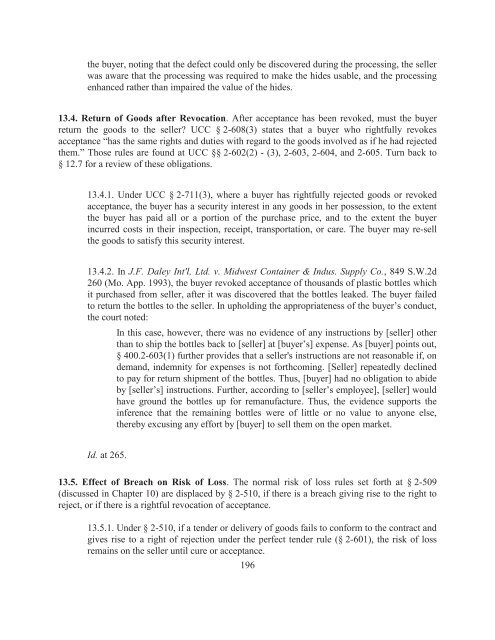Sales and Leases - A Problem-based Approach, 2016a
Sales and Leases - A Problem-based Approach, 2016a
Sales and Leases - A Problem-based Approach, 2016a
You also want an ePaper? Increase the reach of your titles
YUMPU automatically turns print PDFs into web optimized ePapers that Google loves.
the buyer, noting that the defect could only be discovered during the processing, the seller<br />
was aware that the processing was required to make the hides usable, <strong>and</strong> the processing<br />
enhanced rather than impaired the value of the hides.<br />
13.4. Return of Goods after Revocation. After acceptance has been revoked, must the buyer<br />
return the goods to the seller? UCC § 2-608(3) states that a buyer who rightfully revokes<br />
acceptance “has the same rights <strong>and</strong> duties with regard to the goods involved as if he had rejected<br />
them.” Those rules are found at UCC §§ 2-602(2) - (3), 2-603, 2-604, <strong>and</strong> 2-605. Turn back to<br />
§ 12.7 for a review of these obligations.<br />
13.4.1. Under UCC § 2-711(3), where a buyer has rightfully rejected goods or revoked<br />
acceptance, the buyer has a security interest in any goods in her possession, to the extent<br />
the buyer has paid all or a portion of the purchase price, <strong>and</strong> to the extent the buyer<br />
incurred costs in their inspection, receipt, transportation, or care. The buyer may re-sell<br />
the goods to satisfy this security interest.<br />
13.4.2. In J.F. Daley Int'l, Ltd. v. Midwest Container & Indus. Supply Co., 849 S.W.2d<br />
260 (Mo. App. 1993), the buyer revoked acceptance of thous<strong>and</strong>s of plastic bottles which<br />
it purchased from seller, after it was discovered that the bottles leaked. The buyer failed<br />
to return the bottles to the seller. In upholding the appropriateness of the buyer’s conduct,<br />
the court noted:<br />
In this case, however, there was no evidence of any instructions by [seller] other<br />
than to ship the bottles back to [seller] at [buyer’s] expense. As [buyer] points out,<br />
§ 400.2-603(1) further provides that a seller's instructions are not reasonable if, on<br />
dem<strong>and</strong>, indemnity for expenses is not forthcoming. [Seller] repeatedly declined<br />
to pay for return shipment of the bottles. Thus, [buyer] had no obligation to abide<br />
by [seller’s] instructions. Further, according to [seller’s employee], [seller] would<br />
have ground the bottles up for remanufacture. Thus, the evidence supports the<br />
inference that the remaining bottles were of little or no value to anyone else,<br />
thereby excusing any effort by [buyer] to sell them on the open market.<br />
Id. at 265.<br />
13.5. Effect of Breach on Risk of Loss. The normal risk of loss rules set forth at § 2-509<br />
(discussed in Chapter 10) are displaced by § 2-510, if there is a breach giving rise to the right to<br />
reject, or if there is a rightful revocation of acceptance.<br />
13.5.1. Under § 2-510, if a tender or delivery of goods fails to conform to the contract <strong>and</strong><br />
gives rise to a right of rejection under the perfect tender rule (§ 2-601), the risk of loss<br />
remains on the seller until cure or acceptance.<br />
196


















